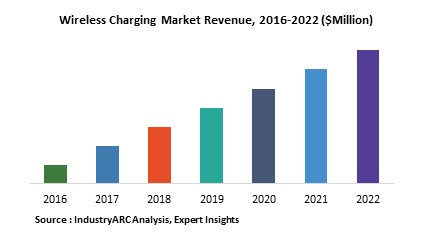Wireless Charging Market - Forecast(2020 - 2025)
Wireless Charging Market Overview:
According to the findings by Forbes, 50.8% of the global population has access to the Internet which translates to 4 billion Internet users. This figure largely attributes to the growing mobile phone users across the globe – a number that was already a whopping 7.512 billion according to World Bank in 2016, and the figure has been incessantly increasing since then. Now, these mobile users open up the market for wireless charging that generated a market revenue of nearly $20 billion in 2018, according to this IndustryARC market research report. Furthermore, the analyst predicts the wireless charging market to grow at a staggering CAGR of 30% over the course of the forecast period of 2019 to 2025.Now, China alone has more than 800 million Internet users, 98% of whom are mobile users, according to a survey by Forbes. Considering that China has a major share in mobile phones market, and the production of consumers electronics is more in Asian countries, APAC tops the regional wireless charging market share with nearly 32%, according to IndustryARC’s electronics market analyst.
Click Here To Request For Sample
 |
| Image: Freepik.com | Wireless_Charging_Market_Trends_Analysis_Forecast_2020_2025 |
Click Here To Purchase Full Report
Wireless Charging Market Analysis
Wireless chargers work on electromagnetic induction through a charging station. It finds a gamut of applications in various sectors such as automobile, healthcare, and industries. However, predominantly, it is used in consumers’ electronics in which it will observe the application CAGR of 25% through to 2025.Wireless Charging Market Growth Drivers:
The Rise in Electric Vehicle and Its Future Prospects –
The vehicular pollution has become a major cause of diseases caused by air pollution. Now, this is creating a global demand for the electric vehicle. Now, according to the IEEE Transportation Electrification Community, wireless charging will be incorporated in all the electric vehicles in order to reduce the risk of exposure to humans. Furthermore, according to the World Bank, the need for electric mobility in China, the U.S., and Europe is catapulting. India is also going to receive $300 million in aid from World Bank for electric vehicle production. These factors will consequently propel the global wireless charging market in the automotive industry.The Implantable Medical Devices Leveraging Wireless Charging –
According to the American Association of Retired Persons (AARP), the market of implantable medical devices holds a very important place in the healthcare sector. These devices that are used as hip, knee or heart implants are now using a wireless charger, which is further bolstering the wireless charging market.
Wireless Charging Market Challenges:
The major challenge dwarfing the wireless charging market revenue is the slower charging rates and expensive technology. Furthermore, wireless charging is not efficient in distant charging which defeats the purpose of the same. However, technological advancements are envisioned to improve the speed of charging by reducing transfer losses.Wireless Charging Market Key Players Perspective:
Convenient Power HK Limited is the market leader in wireless charging systems since 2009, and it has 60 wireless charging patents to its name. The company had also launched the first China smartphone wireless charging in association with Gionee. Such mergers are anticipated to be a trick of the trade in the market during a foreseeable future.Some other key players in the wireless charging market are Energizer Holdings, Inc., Integrated Device Technology, Inc, Leggett & Platt, Murata Manufacturing Co., Ltd., Powerbyproxi Ltd., Powermat.
Wireless Charging Market Trends –
- Apple had acquired New Zealand-based wireless charging company PowerbyProxi in October 2017 for an undisclosed sum of money. The acquisition attributes to Apple’s vision for providing simplified charging.
- PowerSphyr acquired Gill Electronics – a Californian wireless charging company in order to facilitate the development of advanced wireless power solutions.
- Integrated Device Technology, Inc., which is one of the market leaders in wireless charging, is to be acquired by Renesas Electronics Corporation in approximately $6.7 billion.
Wireless Charging Market Research Scope:
The base year of the study is 2018, with forecast done up to 2025. The study presents a thorough analysis of the competitive landscape, taking into account the market shares of the leading companies. It also provides information on unit shipments. These provide the key market participants with the necessary business intelligence and help them understand the future of the wireless charging market. The assessment includes the forecast, an overview of the competitive structure, the market shares of the competitors, as well as the market trends, market demands, market drivers, market challenges, and product analysis. The market drivers and restraints have been assessed to fathom their impact over the forecast period. This report further identifies the key opportunities for growth while also detailing the key challenges and possible threats. The key areas of focus include the types of wireless charging market, and their specific applications in consumers’ electronics, EV, and other industrial and healthcare applications.Wireless Charging Market Report: Industry Coverage
Along with radio wave wireless charging, resonant and micro wave wireless chargers are other offerings by the key marketing players. On the basis of standard, the wireless charging market can be further segmented into WPC, PMA, A4WP, and Open Dots.The Wireless Charging market report also analyzes the major geographic regions as well as the major countries in these regions. The regions and countries covered in the study include:
- North America: The U.S., Canada, Mexico
- South America: Brazil, Venezuela, Argentina, Ecuador, Peru, Colombia, Costa Rica
- Europe: The U.K., Germany, Italy, France, The Netherlands, Belgium, Spain, Denmark
- APAC: China, Japan, Australia, South Korea, India, Taiwan, Malaysia, Hong Kong
- Middle East and Africa: Israel, South Africa, Saudi Arabia




0 Comments